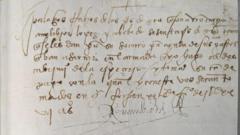In a significant step towards acknowledging and correcting historical injustices, the FBI announced the return of a 500-year-old document to Mexico, authored by the infamous Spanish conquistador Hernán Cortés. This particular manuscript page, written in 1527, is believed to be one of 15 pages that were surreptitiously taken from Mexico’s national archives during the years spanning from 1985 to 1993.
The repatriated manuscript encapsulates crucial financial transactions regarding supplies for expeditions led by Cortés, offering insight into the early stages of Spanish colonization in the Americas. Cortés, whose exploits contributed to the fall of the Aztec empire, played a pivotal role in establishing New Spain, a colonial entity that expanded across vast territories of North America and into parts of Latin America.
Discovered in the United States, the artifact was returned to Mexico on Wednesday, bringing with it the historical context of its origin. Archivists had noticed the page’s absence when they attempted to catalog the collection on microfilm in 1993, only to realize that numerous documents signed by Cortés had gone missing. The returned page bore specific markings made by archivists in the mid-1980s, establishing a timeline for when the document was likely stolen.
Following a formal request from the Mexican government in 2024 for assistance from the FBI’s art crime team, investigators utilized open-source research to trace the stolen page back to the U.S. However, the details about the document's exact location or the identity of its last known owner prior to seizure were not disclosed, nor will there be any criminal charges, as the manuscript had “changed hands several times” since its theft.
FBI Special Agent Jessica Dittmer emphasized the manuscript’s relevance in understanding the historical complexities of the era, noting it reveals intricate details regarding the financial underpinnings of exploration aimed at securing quicker trade routes to the “spice lands” of Asia. This exploration inadvertently led to the European discovery of the Americas and the subsequent colonization efforts.
The timing of this repatriation is particularly poignant, occurring amidst ongoing political discussions and challenges in the relationship between Mexico and the United States, especially related to trade and immigration issues. In light of these tensions, the FBI underscores its commitment to combating the trafficking of cultural artefacts. Dittmer reiterated that such items represent invaluable cultural heritage and are vital for comprehending historical narratives.
As the FBI continues its efforts, the agency is also determined to locate the other pages still unaccounted for from the once-missing collection. This return follows another successful repatriation of a Cortés document to Mexico in 2023, furthering the conversation about the importance of recognizing and rectifying historical thefts of cultural heritage.
















